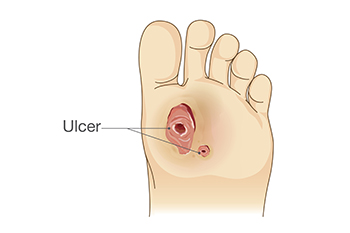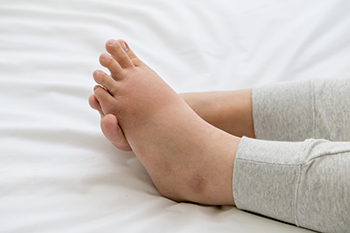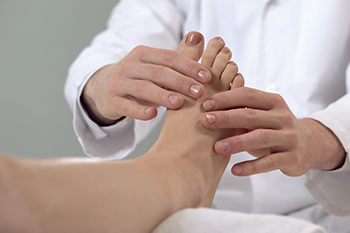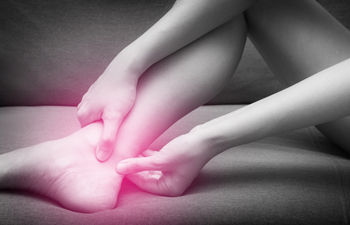NJ (908) 688-5577
NY (212) 737-2528

A common foot condition among diabetic patients is a foot ulcer. Foot ulcers often occur from the inability to feel existing cuts, bruises, or scrapes which can be a result of neuropathy. Therefore, it is imperative to check the soles daily. Additionally, engaging in a gentle exercise routine may be beneficial in increasing circulation to the feet. A diabetic foot ulcer generally requires immediate medical care, and this may help to prevent an impending infection that could ultimately lead to amputation when left untreated. A diabetic foot ulcer can cause severe pain and discomfort, and it is suggested to refrain from putting any weight on the affected foot. Some people choose to wear shoes that are designed specifically for diabetic patients as well as compression wraps that help to improve circulation. If you have diabetes, it is strongly suggested that you are under the care of a podiatrist who can effectively treat and help you to manage this condition.
Diabetic foot care is important in preventing foot ailments such as ulcers. If you are suffering from diabetes or have any other concerns about your feet, contact Glenn Davison, DPM from Advanced Podiatry. Our doctor can provide the care you need to keep you pain-free and on your feet.
Diabetic Foot Care
Diabetes affects millions of people every year. The condition can damage blood vessels in many parts of the body, especially the feet. Because of this, taking care of your feet is essential if you have diabetes, and having a podiatrist help monitor your foot health is highly recommended.
The Importance of Caring for Your Feet
Patients with diabetes should have their doctor monitor their blood levels, as blood sugar levels play such a huge role in diabetic care. Monitoring these levels on a regular basis is highly advised.
It is always best to inform your healthcare professional of any concerns you may have regarding your feet, especially for diabetic patients. Early treatment and routine foot examinations are keys to maintaining proper health, especially because severe complications can arise if proper treatment is not applied.
If you have any questions please feel free to contact our offices located in Union, NJ and New York . We offer the newest diagnostic and treatment technologies for all your foot and ankle needs.

Excessive fluid in the feet can cause extreme swelling. This is an uncomfortable feeling, and is known as edema. Some of the symptoms that can accompany swollen feet include bruising, numbness, and the feet may feel stiff. When the feet become swollen, it may be indicative of existing medical conditions, which include arthritis. Additionally, it may happen as a result of an ankle sprain or fracture, and this typically happens immediately. The feet may become swollen from an insect bite, and this is considered to be an allergic reaction. Some people notice their feet can become swollen from standing for extended periods of time throughout the day, and can be very common among pregnant women. The warmer temperatures may cause the feet to become swollen, and it is suggested that sodium intake is reduced. If your feet are swollen, please schedule an appointment with a podiatrist who can effectively determine what the cause is, and offer correct treatment options.
Swollen feet can be a sign of an underlying condition. If you have any concerns, contact Glenn Davison, DPM of Advanced Podiatry. Our doctor can provide the care you need to keep you pain-free and on your feet.
Swollen feet are a common ailment among pregnant women and people who stand or sit for extended periods. Aging may increase the possibility of swollen feet and patients who are obese often notice when their feet are swelling too. There may be medical reasons why swollen feet occur:
Swollen feet can also be caused by bone and tendon conditions, including fractures, arthritis, and tendinitis. Additionally, there may be skin and toenail conditions and an infection may cause the feet to swell. Patients who take medicine to treat high blood pressure may be prone to getting swollen feet.
Many patients elevate their feet to help relieve the swelling and this is generally a temporary remedy. When a podiatrist is consulted the reason behind the swelling can be uncovered and subsequently treated.
If you have any questions please feel free to contact our offices located in Union, NJ and New York . We offer the newest diagnostic tools and technology to treat your foot and ankle needs.

The ankle is a complex system of bones, tendons, and muscles that connect the leg and the foot. If any one of those elements is compromised, it may result in pain whenever you take a step. If you spend a lot of time running, walking or jumping, some type of pain in the ankle is not uncommon. Most ankle pain is the result of an injury to a muscle, tendon, or ligament. Ankle pain may also be caused by medical conditions, including arthritis, gout, or peripheral neuropathy. An injury, such as a ligament sprain, a muscle strain, or a fractured bone, will likely cause ankle pain and inhibit your ability to walk normally. Pain in the back of the ankle may be connected to an injury of the Achilles tendon. This can become torn, ruptured or inflamed, and severe cases may prevent you from putting any weight on the foot. If you are experiencing ankle pain when you walk, it is a good idea to consult a podiatrist for an exam and a diagnosis. An appropriate treatment plan can then be put into action.
Ankle pain can be caused by a number of problems and may be potentially serious. If you have ankle pain, consult with Glenn Davison, DPM from Advanced Podiatry. Our doctor will assess your condition and provide you with quality foot and ankle treatment.
Ankle pain is any condition that causes pain in the ankle. Due to the fact that the ankle consists of tendons, muscles, bones, and ligaments, ankle pain can come from a number of different conditions.
Causes
The most common causes of ankle pain include:
Symptoms
Symptoms of ankle injury vary based upon the condition. Pain may include general pain and discomfort, swelling, aching, redness, bruising, burning or stabbing sensations, and/or loss of sensation.
Diagnosis
Due to the wide variety of potential causes of ankle pain, podiatrists will utilize a number of different methods to properly diagnose ankle pain. This can include asking for personal and family medical histories and of any recent injuries. Further diagnosis may include sensation tests, a physical examination, and potentially x-rays or other imaging tests.
Treatment
Just as the range of causes varies widely, so do treatments. Some more common treatments are rest, ice packs, keeping pressure off the foot, orthotics and braces, medication for inflammation and pain, and surgery.
If you have any questions, please feel free to contact our offices located in Union, NJ and New York . We offer the newest diagnostic and treatment technologies for all your foot care needs.

Tendons connect muscles with bones. The Achilles tendon—one of the body’s largest tendons—connects the calf muscles with the heel bone. It is an essential component that facilitates movements, such as walking, jumping and running. Athletes engage the Achilles tendon constantly, which makes them more prone to injuring it through overuse. A common Achilles tendon injury among athletes is Achilles tendonitis. Also known as Achilles tendinopathy, this icondition causes pain and swelling in the tendon above the heel bone and, sometimes, ankle stiffness. Podiatrists are experts at diagnosing and treating Achilles tendonitis and other sports injuries that affect the Achilles tendon. Make an appointment with a podiatrist to have your condition diagnosed and treated properly. Left untreated, Achilles tendonitis may lead to degeneration and tearing of the tendon.
Ankle and foot injuries are common among athletes and in many sports. They can be caused by several problems and may be potentially serious. If you are feeling pain or think you were injured in a sporting event or when exercising, consult with Glenn Davison, DPM from Advanced Podiatry. Our doctor will assess your condition and provide you with quality foot and ankle treatment.
Common Injuries
The most common injuries that occur in sporting activities include:
Symptoms
Symptoms vary depending upon the injury and in some cases, there may be no symptoms at all. However, in most cases, some form of symptom is experienced. Pain, aching, burning, bruising, tenderness, tightness or stiffness, sensation loss, difficulty moving, and swelling are the most common symptoms.
Treatment
Just as symptoms vary depending upon the injury, so do treatment options. A common treatment method is known as the RICE method. This method involves rest, applying ice, compression and elevating the afflicted foot or ankle. If the injury appears to be more serious, surgery might be required, such as arthroscopic or reconstructive surgery. Lastly, rehabilitation or therapy might be needed to gain full functionality in the afflicted area. Any discomfort experienced by an athlete must be evaluated by a licensed, reputable medical professional.
If you have any questions, please feel free to contact our offices located in Union, NJ and New York . We offer the newest diagnostic and treatment technologies for all your foot care needs.